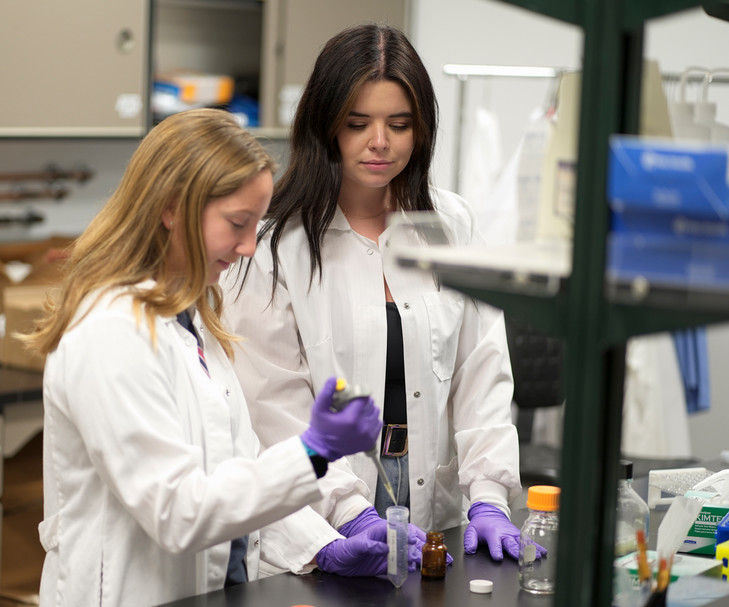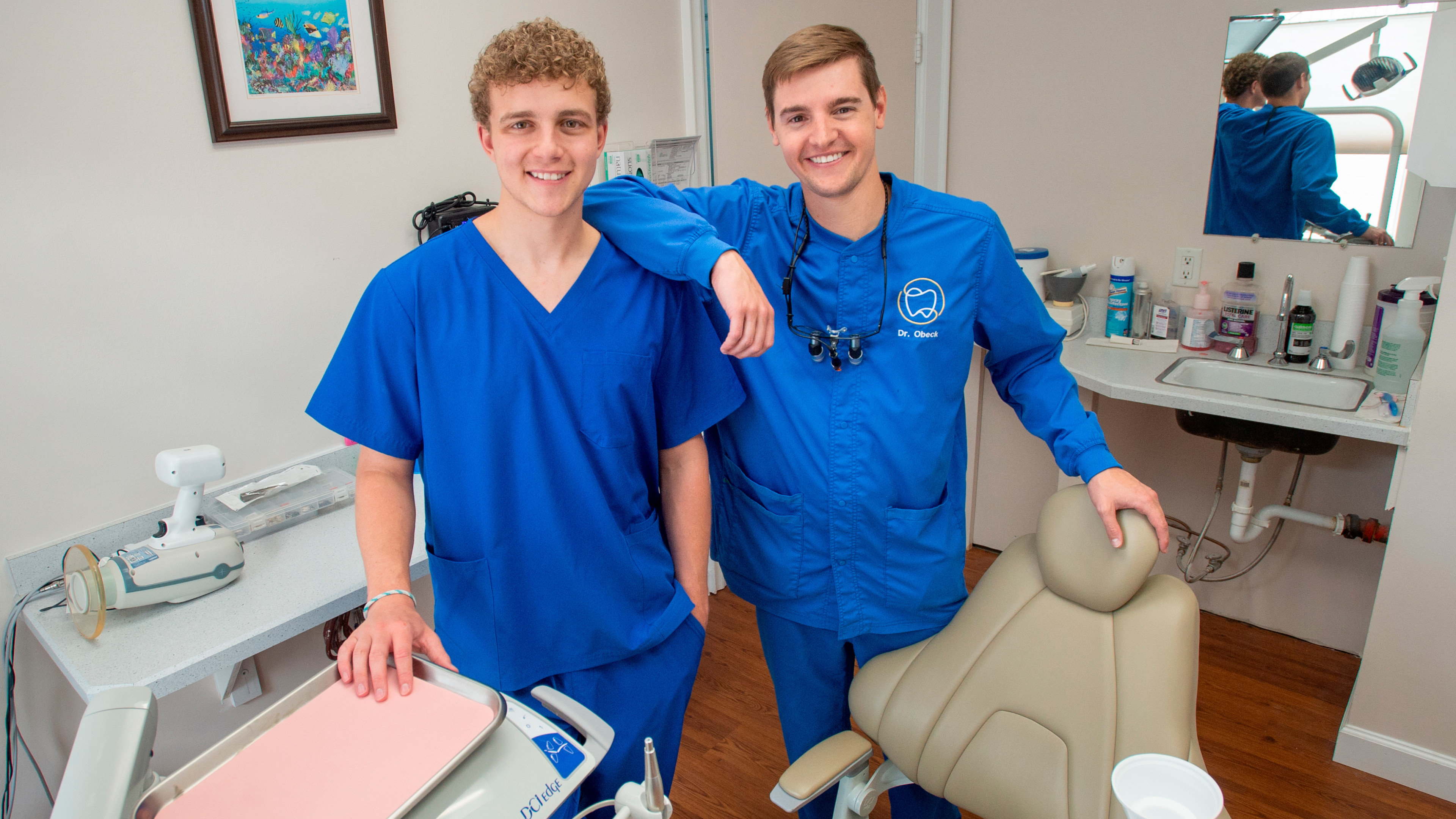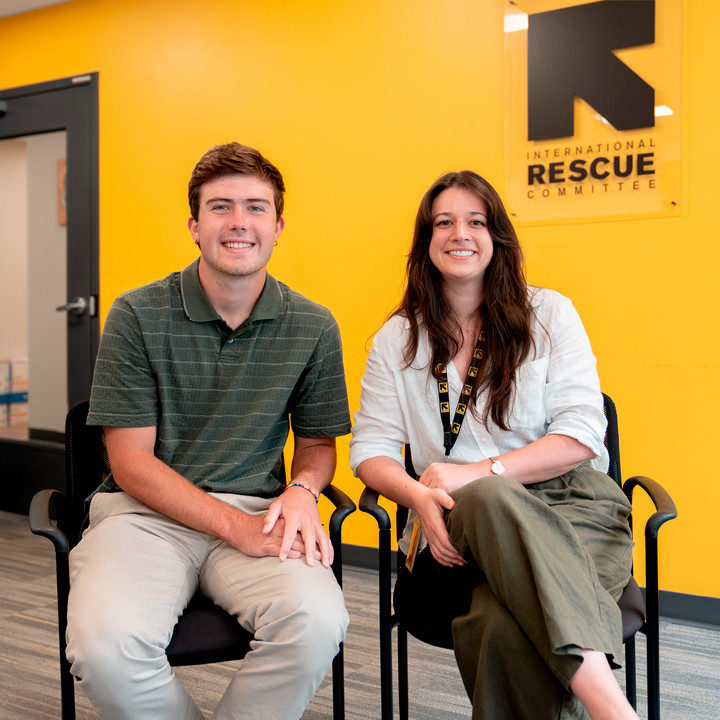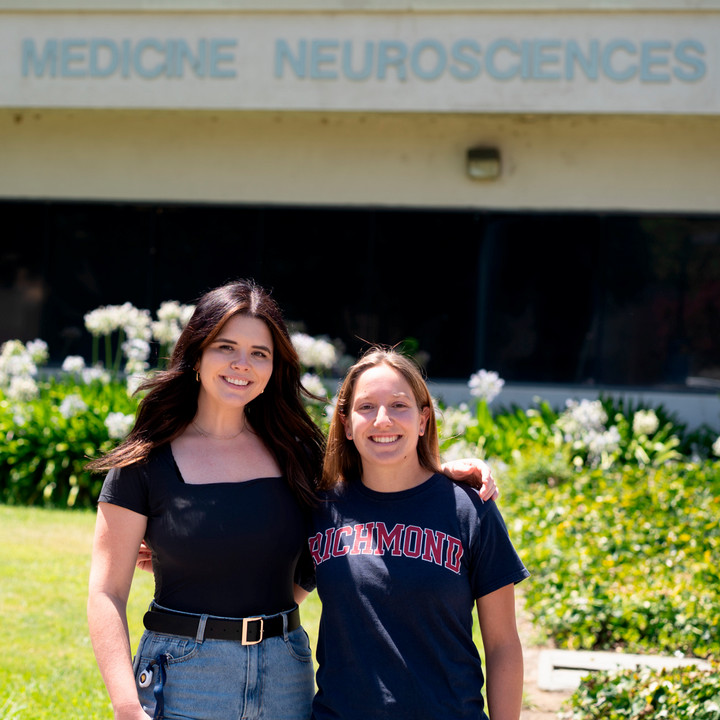Every summer, dozens of University of Richmond students fan out across the country, packing their Spider pride and career ambitions for internships funded by the university’s signature Richmond Guarantee. But what happens when those students are paired with mentors who once walked the same campus paths, ate in the same dining hall, and survived the same 3 a.m. study sessions?
Magic.
Here are five reasons why a summer internship supervised by a fellow Spider alum isn’t just a line on a résumé — it’s a game-changer.
1. They create a welcoming space for real learning.
When alumna Kendall Stewart, ’21, now a doctoral candidate in neuroscience at UC Davis, was approached about hosting a biology major from Richmond, she didn’t hesitate. “I remembered what it was like to be in her shoes,” Stewart says. “Curious about neuroscience but not sure what that meant in practice.”
Stewart gave her intern — Sarah Zoglin, ’27 — what she called a “platter of science.” Zoglin’s platter included animal behavior experiments, brain tissue histology, microscopy, and the kind of close mentoring that’s rare in early undergrad research experiences. “She’s not just observing,” Stewart says. “She’s doing real science.”

Zoglin handled rodent brains, ran behavior trials, and learned how to slice and analyze tissue using professional lab equipment. She worked side-by-side with graduate students and attended lab meetings to understand the broader scientific process — the hypothesis-building, troubleshooting, and storytelling behind every experiment.
“I wasn’t sure what to expect coming in,” Zoglin says, “but Kendall made the lab feel approachable and exciting. I’m doing things I never thought I’d be trusted with as a student. It’s made me even more sure that neuroscience is what I want to pursue.”
That kind of access — to tools, techniques, and time with professional researchers — doesn’t happen by accident. It takes a mentor who’s invested in their mentee’s growth. In Zoglin’s case, that meant someone who saw a bit of herself in her intern, and who knew from her own experience at Richmond what great mentorship can look like.
“She’s inquisitive,” Stewart says. “She asks questions. She’s honest when she doesn’t know something. That’s not a weakness — that’s a strength. Especially in science.”
Stewart’s takeaway from mentoring Zoglin? “It reminded me how much effort my mentors put into me — and how good it feels to pay that forward.”
2. Interns get real work done — not just shadowing.
There’s something powerful about a mentor who knows exactly where you’re coming from — because they came from the same place.
Take Eric Harnisher, ’26, who completed a summer internship at the International Rescue committee in Richmond. He initially applied to one department but was placed in a different department under the supervision of a fellow Spider, career development specialist Abby Photiadis, ’15. His flexibility and openness to pivoting impressed her. “He just jumped in,” she says. “That’s very U of R — that openness, that curiosity, that drive to make things work.”
What started as a practical solution turned into an ideal match. “There’s a certain kind of student that U of R attracts and develops,” Photiadis says. “Professionalism, empathy, motivation — I knew I could trust him to get things done.”
She trusted him because she understood him. As a Spider, Photiadis knew what kind of training, mindset, and work ethic the university instills. She’d been in his shoes, navigating internships, unsure what the “real world” would actually look like. That empathy made her a more intentional mentor. She invited Harnisher to team meetings, encouraged him to speak up in planning sessions, and challenged him to think beyond checklists to build something meaningful.
“[Eric] just jumped in. That’s very U of R — that openness, that curiosity, that drive to make things work.”
“Abby gave me real responsibility right away, which was exciting and a little intimidating,” Harnisher says. “But she made it clear that she believed in me. That helped me believe in myself.”
That shared understanding helped Harnisher thrive. Photiadis didn’t just give him tasks — he got to lead workshops, contribute to program development, and take ownership of projects. He wasn’t just an intern; he was a teammate.
And it turns out, that sense of camaraderie can come from shared Ultimate Frisbee roots just as easily as shared academic values. “I played on the Spidermonkeys, too,” Photiadis says. “It’s a small thing, but it was an instant connection.”
3. Alumni mentors “get it” — and that makes all the difference.
Jack Bricklemyer, a trumpet-playing music major and biology minor, spent his summer interning at a dental practice in Tampa, Florida, under Dr. John Obeck, ’16. From the outside, it might have looked like a stretch — music major, dental office?
But thanks to Obeck’s mentorship, Bricklemyer (left in article lead photo, with Obeck at Obeck’s practice) didn’t just observe procedures. He got his hands dirty — sometimes literally. “I’m taking impressions, making retainers, building crowns in the lab,” he says. “I thought I’d be sterilizing tools all day, but I’ve actually been doing real dental work.” It’s good preparation for the next step in his career ambitions: dental school.
Bricklemyer assisted chairside during procedures, set up treatment rooms, and even jumped in to fix office tech issues. He learned how to chart new patients and navigate patient interactions with confidence — all skills that most won’t get to practice until dental school.
For Obeck, the hands-on approach is intentional. “If someone’s willing to learn and take initiative, I want to give them every opportunity to grow,” he says. “Jack’s not just here to watch — he’s here to contribute. And he’s been outstanding.”
Bricklemyer lived up to the challenge. “Dr. Obeck treats me like a future colleague,” he says. “He teaches me things in his free time and asks if I have questions. We’re buddies. He wants me to succeed.”
That trust comes from somewhere strong: “He’s a Spider,” Bricklemyer says. “We talk about old classes, Greek life, and what’s changed on campus. There’s a shared language. He gets where I’m coming from — and where I want to go.”
4. Mentorship teaches both sides something new.
While students like Bricklemyer, Harnisher, and Zoglin walk away with hands-on experience, their mentors gain something just as valuable: perspective.
Photiadis, the former teacher turned career development professional, says mentoring clarified her own priorities. “When you have to explain your work to someone else — someone who’s new and genuinely curious — it forces you to get clear on your ‘why.’ It sharpens your focus.” She adds, “It also pushes me to be more intentional. I want to give Eric not just tasks, but context — to show him how the pieces fit together and why our work matters.”
For Stewart, mentorship deepened her appreciation for the people who supported her journey. “Investing in Sarah helped me see the investment others made in me,” she says. “It’s a powerful full-circle moment. It reminded me how lucky I was to have people who encouraged me early on — and how impactful that encouragement can be.”
And for Obeck, mentoring Bricklemyer isn’t just a nice thing to do — it’s a long-term investment in his field. “He’s basically a dental assistant in everything but name,” Obeck says. “He’s smart, reliable, and great with patients. Mentoring him has made me think more carefully about how we teach and bring people into this profession. I’ve had to articulate things I normally do out of habit — and that’s been good for me, too.”
“Investing in Sarah helped me see the investment others made in me.”
5. It’s a shortcut to belonging — and a long-term network.
The Richmond Guarantee provides funding to students taking on an unpaid or under-paid internship opportunity. Having an alum as a mentor guarantees something additional: connection.
For many students, an internship is their first foray into the professional world. Walking into that space knowing your mentor once sat in the same lecture halls is grounding. It’s an instant bridge across generations — a reminder that success isn’t some distant dream. It’s possible, and it’s personal.
“If I’m lucky enough to be where Dr. Obeck is in a few years, I’d 100% take on a Richmond student. There’s a certain culture at U of R — we all take care of each other.”
“These students remind me why I loved Richmond,” Photiadis says. “It reignites my connection to the university.” The shared bond doesn’t just make her proud — it makes her more invested. “I want to see them succeed because I see myself in them.”
Stewart agrees. “It’s easy to feel far from your alma mater when you’re 3,000 miles away. But mentoring a fellow Spider brought it all back.” The two found themselves swapping campus stories and comparing notes on their old residence halls and professors. “It felt like time folded over. We had different paths, but the same roots.”
Bricklemyer’s already thinking ahead. “If I’m lucky enough to be where Dr. Obeck is in a few years, I’d 100% take on a Richmond student. There’s a certain culture at U of R — we all take care of each other.” He’s seen firsthand how that bond can turn a summer internship into something that lasts well beyond August — a mentorship, a professional connection, and a reminder that Spiders always look out for Spiders.
Final word: If you’re a student — apply. If you’re an alum — say yes to a Spider intern.
The Richmond Guarantee opens doors by removing a major barrier between students and meaningful work. And when that opportunity is paired with mentorship from a fellow Spider, the impact multiplies.
Students gain experience, yes. They also gain advocates — people who understand where they’re coming from and are willing to invest in where they’re going. Alumni, in turn, get help on a project, plus the chance to shape someone’s early career and reconnect with the university that helped shape theirs.
For these Spiders, the advice is the same whether you’re a student wondering whether to apply or an alum wondering whether to host. Say yes.
Photography by: Jay Nolan (top image), Stanford Lee, '19 (second and fourth images from top), and Jamie Betts (third image from top)


